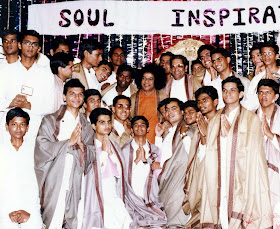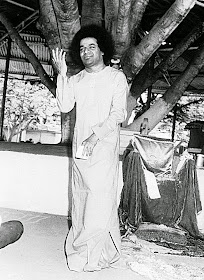One should yearn for purification rather than prolongation of life. A few moments as a Hamsa, the celestial swan, are far more precious than many years as a crow. In order to sublimate the lower yearnings of man, to lead him along the path of holiness, and to hold before him the glorious destiny of his oneness with the Cosmic Consciousness, the Vedas have laid down many lessons in the form of profound axioms, summarizing realizable truths.
Prajnanam Brahma
Each Veda has one central declaration, or Mahavakya, around which it revolves. ‘Prajnanam Brahma’ is the holy declaration of the Rig Veda. Prajnanam means ‘constant integrated awareness’. This is present and active, in all things, at all places, all the time. It energizes the physical, mental and spiritual realms, the lower, middle and higher regions, and the sub-human, human and super-human beings. The three periods of time (past, present and future), the three realms of existence (nether, spatial and heavenly worlds), and the three modes of being (goodness, passion and inertia – Satva, Rajas and Tamas) are all pervaded and permeated by Prajnanam or Chaitanya (pure consciousness).
Aham Brahmaasmi
‘Aham Brahmaasmi’ is the holy declaration of the Yajur Veda. ‘Aham’ implies the total composite personality. Man is subjected to countless thoughts, desires and resolutions called ‘Sankalpa’. The very first Sankalpa that nestles in the mind of man is ‘Aham’ or I-ness. Other ideas or thoughts eventually leading to action can enter the mind only after Aham has struck root. Before that, no acceptance or rejection, no Sankalpa can find a place. The ‘I-ness’ persists in the gross body in the waking state, the subtle body in the dream state and in the causal body in the deep sleep state. It persists through all three states. That which permeates all three states, the ‘I’, is Aham. ‘I’ is the universal response. The answer that arises from everyone is ‘I’, ‘I’, ‘I’. ‘I’ is in every one, the core of all.
Next, we have the expression ‘Brahma Asmi’, (I am Brahman). This truth can be made clear by an example. To curdle milk and get curds for use, we add a small quantity of curd to the milk. All the milk then turns into curd. Wherefrom did we get the curd initially? From milk which was similarly treated. The years of life are the milk, the Divine principle, Brahman, is the curd. When this Divine principle is welcomed to pervade life, it converts life into a Divine saga. This is what the Upanishads mean when they declare, “He who knows Brahman becomes Brahman (Brahmavit Brahmaiva Bhavati)”. Asmi is the process of mixing, the consummation of adding, the merging, the union. When it happens, Aham becomes Brahman. When humanness is permeated by Godliness, man becomes God. For, what is it that takes place subsequently? The milk that has been curdled is churned by inquiry and inner probe and the soft sweet fragrant butter – Ananda (Divine bliss), emanates from it. This Ananda can be gained only through, and from, the Divine. Hence it is proclaimed that Ananda is the core of all the Vedas, the fruit of all the Shastras (scriptures). One must have faith in this truth, or else, he will miss the fruit. Swami, very often, stresses the need for faith. For, where there is faith, there is love. Where there is love, there is peace. Where there is peace, there is truth. Where there is truth, there is bliss. And, where there is bliss, there is God.
Faith in people, nowadays, is dwindling. Some have even lost it. Yet they desire for Ananda. Ananda cannot be procured from any shop or ordered from any company. Many enquire, “How do you develop faith? What are the reasons for faith?” But, one cannot define or demarcate the reasons. Faith arises in the heart through imperceptible conviction. One has faith in son and father, husband and wife, but one cannot explain why? Neither does it arise in the mind, nor is it a result of external causes. The ‘I’, when limited to the body and labeled on the form, turns harmful, bringing about pride and selfishness. The ‘I’, when identified with the Atman (True Self), is sanctified and leads to the merger with the Brahman (the Divine Self). Do not take this temporary trivial body, which is like a water bubble, as Aham. For, what exactly is this ‘I’? You use the words ‘I’ and ‘mine’ from morning till night, repeating ‘My home’, ‘My body’, ‘My life’, ‘My senses’, ‘My’, ‘My’, ‘My’, without delving into the ‘I’ that owns these. When you are in deep sleep, you don't feel the ‘I’, or think of the ‘I’, or worry about any ‘Mine’. Where does it go to then? How can this ‘I’, which abandons you during the few hours of sleep, be with you during the permanent sleep from which you do not wake? Sleep is a short death. Death is a lasting sleep. Consider the attachments that develop between one another. Then you can arrive at the truth of ‘Aham Brahmaasmi’.




.jpg)
.jpg)















